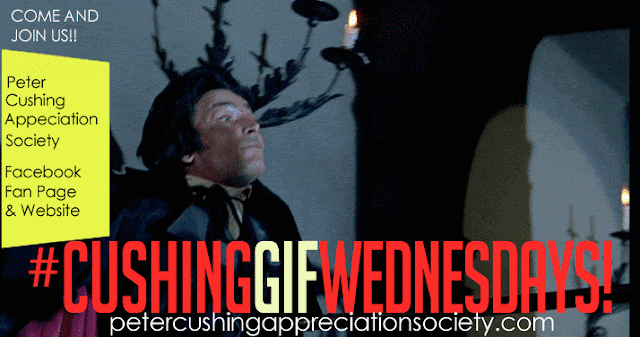FOLLOWING ON from my look at Island of Terror, in PART ONE, this week I’m tackling its spiritual successor, NIGHT OF THE BIG HEAT. As discussed last week, these two films represent a section of only a small number of Science Fiction films that Cushing lent his talents too and it’s hard to discuss one without the other. Both were made by the short-lived Planet films and Night, featuring the same director (Terrence Fisher), Composer (Malcolm Lockyer) and of course Cushing again, does feel in many ways like a natural successor to the previous film.
PLANET FILMS EVEN SEEM to have gone a little further
this time, with Cushing only having a small role and Christopher Lee taking the
lead, having those two names on the poster would mean box office dynamite,
surely? Unfortunately, I must confess to being somewhat ‘cold’ when it comes to
Night of the Big Heat. Whilst not a
bad film, in many ways it pales in comparison to Island of Terror.
FOR A START there’s the story. Night, is a fairly basic alien invasion story utilising elements
from an earlier (and much better) British Science Fiction film, The Day the Earth Caught Fire (1961), by
having the temperature slowly rise. Christopher Lee plays Godfrey Hanson, a
scientist staying in a small hotel owned by Patrick Allen’s Jeff Callum on the
isolated island of Fara, somewhere off the English coast. Jane Merrow shows up
as an old flame of Cullum’s with whom he had an affair and who seems determined
to cause trouble for him and his marriage. However they all have bigger fish to
fry when Hanson reveals that the rising heat is actually being caused by an
alien invasion…..and it’s only going to get hotter.
ONE OF THE BIGGEST PROBLEMS with Night, is that at points it actually strays a little too close to Island. For example, the opening scene
in which the radar equipment is destroyed and we have a freeze frame into
titles, exactly like Island, really
isn’t necessary. In Island, this was
effective as it still didn’t spoil the mystery of the plot- we knew there was
an explosion in a lab, but we don’t know yet what that lab is and Islands superior script is far too
intelligent to reveal anything to its viewers off the bat.


IN 'NIGHT' A SIGNIFICANT amount of time is
devoted to the characters attempting to get to the radar station (indeed
Cushing dies for it) but we as an audience know that there’s no point because
we saw it destroyed in the opening 2 seconds. Then there’s also the end, whilst
the trick of having it all seems hopeless and then having an almost surprise revelation.
Again, in Island, that revelation
felt a great deal more intelligent than it does here and the sudden rain storm
saving the day, is faintly ridiculous.

OF COURSE I’m not ignoring the fact that
Island was an original story whilst Night is based on a novel by John
Lyminton. Having not read that book I can’t comment if these problems are
inherent within it, or whether they are unique to this adaptation. However its
literary heritage in 50’s British Sci-Fi does lead to one of the strengths of Night, and that is of course it’s
wonderfully John Wyndham-esque atmosphere. The old trope of the heroes spending
much of the end of the world in a pub is seen here and it’s as effective now as
in any other British Sci-Fi flick (such as another of Fishers sci-fi films, The Earth Dies Screaming from 1964).
ABOVE OUR EXCLUSIVE PCAS COMPETITION : WIN THE MOVIES FROM THIS PCAS FEATURE! : ENTER NOW : GOOD LUCK!
THERE ARE SOME POSITIVE things that this film manages
to duplicate from Island. That being
the sense of danger. Lee’s character of Hanson makes it through most of the
film, then dies minutes before the end. Killing off essentially your biggest
name and one of the two leads minutes before the resolution is a brave move and
again makes the viewer think that there really is no hope. Lee plays the part
of Hanson as well as he plays any role, though unfortunately he’s not really
given anything new to do and so it’s hardly a standout role in his career.


PATRICK ALLEN IS A GOOD leading man- though he struggles with a character that
for the most part comes across as inherently unlikeable. This is due mostly to
the ‘affair’ subplot which, whilst actually being one of the most enjoyable
parts of the film, doesn’t really set his character up as the most likeable of individuals
and really should have been revealed later. As stated in my review of Island, Cushing has a small but
enjoyable role- though it’s really too dismissible to really stand out in his
filmography. His death lingers due to a wonderfully charming performance, his
easily the most likeable character in the entire film. However special mention
has to be made of Jane Merrow, who plays the role of Angela Roberts with such a
maliciousness that she is utterly watchable the entire time.
IN SOME WAYS I feel I have been way to negative
towards Night, and perhaps it will be
a film that I’ll revisit in my column again someday because for the most part-
it’s bloody good fun. This isn’t like Incense
for the Damned (1970) or Tender
Dracula (1974) where there really is little to no joy to be had, in fact I
feel ashamed even mentioning those movies in this review because Night of the Big Heat isn’t even a bad
film. It’s a perfectly well made science fiction horror film, let down by a few
small elements that don’t allow it the originality that made Island of Terror, so damn good.
WRITTEN BY CALLUM MCKELVIE: If you would like to share YOUR THOUGHTS with CALLUM about the film or the feature you can contact him HERE: spookycallum58@gmail.com
IF YOU LIKE what you see here at our website, you'll love our daily themed posts at our PCAS FACEBOOK FAN PAGE.
Just click that blue LINK and click LIKE when you get there, and help
us reach all lovers of Peter Cushing's work AND Help Keep The Memory Alive!
























































